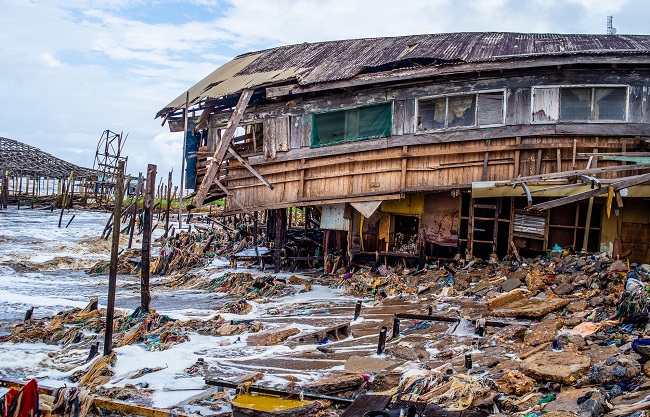The Ilaje Nation – ancient, resilient, and river-kissed – now stands at the trembling edge of extinction, not by war or pestilence, but by the silent, swelling rage of the Atlantic Ocean. Once adorned with miles of uninterrupted coastlines, thriving fishing settlements, and proud ancestral homes, Ilaje Land in Ondo State is slowly, tragically drowning.

With every crashing wave and receding shoreline, a piece of Nigeria’s coastal heritage is lost. What was once a bastion of livelihood and culture is now becoming a watery grave for homes, histories, and hopes.
This devastation is not a distant theory or the alarmist imagination of environmental crusaders. It is a real and present danger. From Ayetoro – that famous floating city built by faith and engineering – to towns like Mese, Idiogba, Gbagira, and Awoye, Ilaje communities are facing what geologists term rapid coastal regression: the coastline is retreating by as much as 30 meters annually. Entire villages are swallowed overnight, with no ceremony, no compensation, and often, no return.
The sea has become both metaphor and monster – relentless, unprovoked, and unappeased. Children go to bed on land and wake up surrounded by water. Schools and churches crumble into the Atlantic. Cemeteries vanish, denying generations even the dignity of remembrance. It is not just land that is eroding – it is identity.
Where is the Outrage? Where is the Urgency?
This unfolding catastrophe has received neither the national outrage it deserves nor the global emergency classification it demands. Yet, the evidence is undeniable. According to climate vulnerability indices, Ilaje is among the most climate-endangered coastal belts in sub-Saharan Africa. The geography is under siege from rising sea levels, tidal surges, saline intrusion, and ecological collapse. Agriculture is dying. Fishing routes are shifting. Groundwater is turning brackish. Poverty is deepening. Youth are fleeing. Despair is becoming institutional.
And still, the silence from the corridors of power is deafening.
Successive administrations – both state and federal – have treated Ilaje like a footnote. Palliative interventions, when they come, are cosmetic at best, corrupt at worst. Erosion control contracts become phantom projects. Jetty promises become broken echoes. No master plan. No international partnerships. No coordinated resilience strategy. The people are left to build sandbags with their bare hands – to pray and perish.
The Double Tragedy: Apata Obe in Exile
Amid this environmental genocide is the long-ignored humanitarian crisis of Apata Obe – a historic community under the Ugbo Kingdom. Over two decades after the tragic Ilaje-Ijaw intertribal conflict, the people of Apata Obe remain forcibly displaced from their ancestral homeland, living in silent exile within their own state. Despite numerous peaceful appeals and efforts for return and reconciliation, they remain locked out of their birthright – lands now desolate, untended, and void of dignity.
It is no longer a matter of if but when these citizens, driven by frustration and desperation, will resort to self-help. Their patience is fraying. Their youths are restless. Their elders, exhausted. And their dignity, assaulted daily by official indifference. It is time the government of Ondo State, led by Governor Lucky Orimisan Aiyedatiwa, took decisive steps to resolve this long-standing injustice – not merely as a political necessity but as a moral obligation. The displaced of Apata Obe are ready to return. They want peace, not provocation. They seek justice, not revenge.
What will history say of us – and of you, Excellency – if this cycle of exclusion continues unbroken?
A Call for Conscience and Courage
The time has come to pierce the conscience of power and shake the apathy of the world. Governor Aiyedatiwa – himself an Ilaje son – must now rise above the constraints of party timelines and political convenience. He must lead the charge for a Climate Emergency Declaration for Ilaje Land, backed by measurable investments, donor collaborations, and sustainable shoreline defense projects. And he must spearhead the repatriation and reintegration of Apata Obe – not just for peace, but for posterity.
To do otherwise – to govern while Ilaje drowns and Apata Obe remains exiled – is to betray both legacy and justice.
This is not merely about environmental rescue. It is about cultural survival, economic justice, and strategic national security. Let us not forget: Ilaje communities sit atop vast oil reserves, host critical fishing routes, and represent the largest coastal ethnic nationality in southwestern Nigeria. To lose Ilaje – or to let her fracture further – is to weaken Nigeria’s coastal integrity.
A Moral Imperative for the World
To the global community, Ilaje is your frontline. Climate change knows no borders. The oceans we ignore today will knock at your own shores tomorrow. The UN, EU, World Bank, and climate justice movements must rise with us. Ilaje is not a footnote – it is a flashpoint. This is where adaptation must meet action. This is where silence must yield to solidarity.
The world rallied for the Amazon. It rose for the Maldives. It wept for Jakarta. Ilaje must not be left behind. Her coastlines may be drowning, but her voice must not be.
Let the Sea Not Win
Let history record that Ilaje cried out – not as helpless victims, but as a people demanding visibility, justice, and dignity. Let it be known that a community stood against the tide, not with weapons, but with will. And let it also be recorded that leaders with vision answered the call, not with excuses, but with courage.
Ilaje is drowning. Apata Obe is exiled.
But they do not seek pity.
They seek policy. They seek protection. They seek return.
The sea must not win.
By Kunle Odusola-Stevenson
